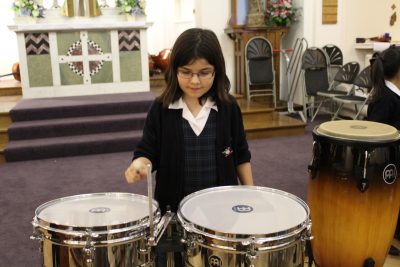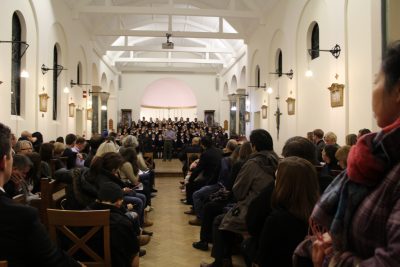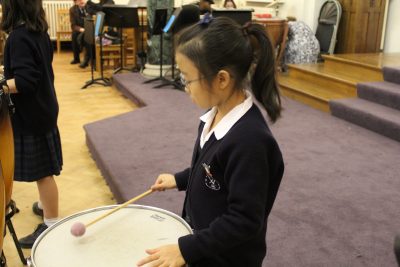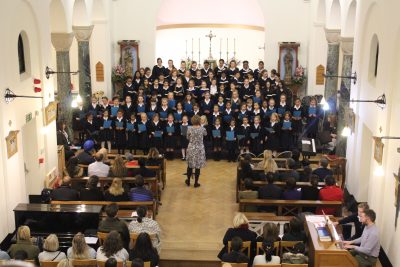We lift our hearts in joyous song to honour Him this way,
and while we sing remembering to sing is to doubly pray
On Thursday 24th November, we celebrated the feast of St Cecilia, Patron Saint of Musicians, with our annual St Cecilia Concert. The Junior and Senior school ensembles, orchestras and choirs performed in a packed Chapel yesterday evening for students, parents and staff who heard sensations from Bohemian Rhapsody to Greensleeves. We were greeted this morning with a delighted email from Mrs Cotton, Deputy Headteacher applauding all those who were involved in the concert; “it was an absolute joy to watch the combined junior and senior choirs (80 strong) singing beautifully from memory and all the instrumental groups and the brilliant soloists from Form III. We had performers from Lower I – Upper VI. Bravo! Particular congratulations should also go to the precentors, Yara and Charlotte, who I thought were very professional and efficient in setting up each musical item and assisting the Music Department. If you speak to any of the performers today, please do praise them.”
Dr Higgins, Director of Music, also wishes to extend his thanks in wake of the concert, “The St Cecilia Concert was a great success this year. It was great to see so many girls taking part, and to see the Chapel so full of parents and visitors. The girls worked incredibly hard to prepare for the concert, and my thanks goes to each and every one of them, and to you for your support – I hope you all enjoyed the evening. Thanks must also go to the music staff who coached the various groups, and to the many staff who helped in the preparation of the concert, and who helped on the night.”
This morning on Friday 25th November, our Lower V Alpha class presented an assembly on St Cecilia, which follows below:
‘When St Cecilia was forced to marry the pagan, Valerian, she is said to have heard heavenly music inside her heart as the musicians played at her wedding so she sang in her heart to the Lord. While the details of her story appear to be fictional, her existence and martyrdom are considered a historical fact. She is said to have been beheaded with a sword. An early Roman Christian church, Santa Cecilia, was founded in the fourth century in Rome, which is said to have been the site on which she lived. A number of musical compositions are dedicated to her, and her feast day on 22nd November became the occasion for concerts and musical festivals.
St Cecilia is known as the patroness of music. The first record of a music festival in her honour was held at Évreux in Normandy in 1570. In the Victorian era St Cecilia captured the imagination of a variety of artists. Music is an easy, powerful way to express feelings and to motivate a large audience to act on these words. Music has inspired us to make the world a happier place by spreading joy through song, for example when Will.I.Am sang ‘Where is the Love?’ about how we need to spread love around the world, and ‘Do they know it’s Christmas?’ by Band Aid where many celebrities came together to raise awareness for those less fortunate.
John Dryden was one of the dominant literary figures of the English Restoration period. Dryden’s poem, ‘A song for St Cecilia’s day’ written in 1687 to commemorate St Cecilia’s day, celebrates and glorifies the power of music, and was set to music for the formal day of celebration on 22nd November. The poem begins by describing the creation of the universe and the role of music in creating harmony.
From harmony, from Heav’nly harmony
This universal frame began.
When Nature underneath a heap
Of jarring atoms lay,
And could not heave her head,
The tuneful voice was heard from high,
Arise ye more than dead.
Then cold, and hot, and moist, and dry,
In order to their stations leap,
And music’s pow’r obey.
From harmony, from Heav’nly harmony
This universal frame began:
From harmony to harmony
Through all the compass of the notes it ran,
The diapason closing full in man.
What passion cannot music raise and quell!
When Jubal struck the corded shell,
His list’ning brethren stood around
And wond’ring, on their faces fell
To worship that celestial sound:
Less than a god they thought there could not dwell
Within the hollow of that shell
That spoke so sweetly and so well.
What passion cannot music raise and quell!
The trumpet’s loud clangor
Excites us to arms
With shrill notes of anger
And mortal alarms.
The double double double beat
Of the thund’ring drum
Cries, hark the foes come;
Charge, charge, ’tis too late to retreat.
The soft complaining flute
In dying notes discovers
The woes of hopeless lovers,
Whose dirge is whisper’d by the warbling lute.
Sharp violins proclaim
Their jealous pangs, and desperation,
Fury, frantic indignation,
Depth of pains and height of passion,
For the fair, disdainful dame.
But oh! what art can teach
What human voice can reach
The sacred organ’s praise?
Notes inspiring holy love,
Notes that wing their Heav’nly ways
To mend the choirs above.
Orpheus could lead the savage race;
And trees unrooted left their place;
Sequacious of the lyre:
But bright Cecilia rais’d the wonder high’r;
When to her organ, vocal breath was giv’n,
An angel heard, and straight appear’d
Mistaking earth for Heav’n.
As from the pow’r of sacred lays
The spheres began to move,
And sung the great Creator’s praise
To all the bless’d above;
So when the last and dreadful hour
This crumbling pageant shall devour,
The trumpet shall be heard on high,
The dead shall live, the living die,
And music shall untune the sky.’
Categories: Faith Life Junior Senior Sixth Form Whole School






